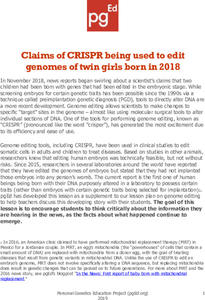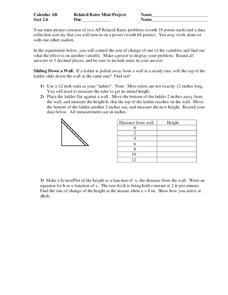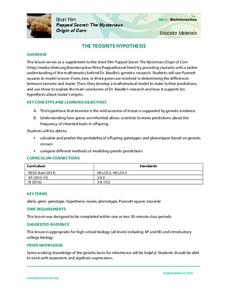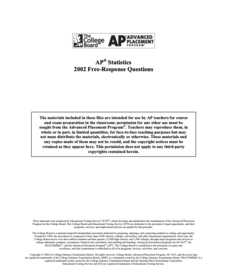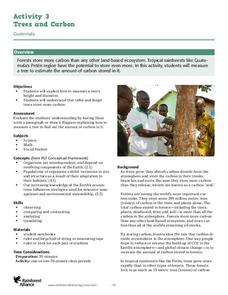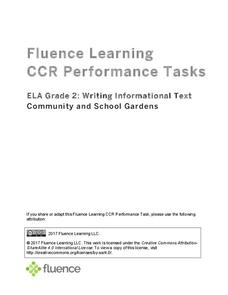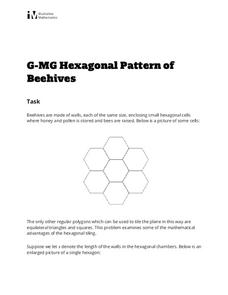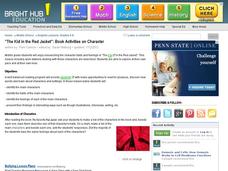Personal Genetics Education Project
Claims of CRISPR Being Used to Edit Genomes of Twin Girls Born in 2018
Here is an activity that blends genetic technology, literacy skills, and critical thinking. Pupils review background information about cell lines and CRISPR by video and teacher-led discussion. Scholars collaborate to analyze two...
Curated OER
Social Studies Current Event Worksheet
Who, what, when, where, why, and how. This current events worksheet uses the traditional news article format and asks reviewers to record information included in a self-selected, current events article. Class members then use the...
Houston Area Calculus Teachers
Related Rates
Use a hands-on approach to exploring the concepts of related rates in your AP Calculus class. Individuals explore the effect of the rate of change on a variable related to a variable they control. After analyzing the data they...
Howard Hughes Medical Institute
The Teosinte Hypothesis
Don't want to sound corny, but your class will be a-maize-d by an engaging activity! Explore the history of the modern corn plant through a video and Punnett squares. Junior genetics experts get hands-on experience with actual research...
College Board
2002 AP® Statistics Free-Response Questions
Statistically, prepared classes perform better. Teachers and pupils use the released 2002 AP® Statistics Free-Response questions to gain an understanding of how questions may be worded on the exam. Resources request that teachers put an...
National WWII Museum
Pearl Harbor: Analyzing FDR's Pearl Harbor Address
FDR's words calling the attack on Pearl Harbor a "day in infamy" have been immortalized. Learners use analysis and discussion questions to consider the origins and drafting of the famed speech that brought the United States into World...
Academy of American Poets
Teach This Poem: "The Metier of Blossoming" by Denise Levertov
Poetry analysis need not be a lugubrious exercise for young learners. The approach used with Denise Levertov's poem, "The Metier of Blossoming" is one of close observation, of noticing and reflecting on the words, phrases, and images the...
Curated OER
Online Behavior: Privacy and Ethics
Over the course of three classes, tech-saturated youth review their cyber portraits, map their virtual lives, examine their relative anonymity, and establish a "virtual conscience" to guide choices that foster privacy protection and...
Museum of Disability
Looking Out for Sarah
Perry the dog is Sarah's best friend and her guide to the visual world. Young readers learn about guide dogs and communication with Looking Out for Sarah by Glenna Lang, through a series of discussion questions and activities.
Santa Monica-Malibu Unified School District
Parts of Speech Pre-Test: The Building Blocks of Grammar
Help your learners get a good grasp on grammar. An insightful pre-test allows teachers to learn about their young writers' knowledge of the building blocks of grammar, so they can begin building a unit of study. It includes a...
Curated OER
Intelligence in the Internet Age
Does technology affect our intelligence? Stefanie Olsen's article, "Intelligence in the Internet Age," and the thought provoking reading comprehension questions that follow, are sure to generate a lively discussion.
Rainforest Alliance
Trees and Carbon
You'll find everything but the kitchen sink here ... or just a carbon sink. In the activity, pairs or groups of middle school learners go outside and measure a tree's circumference and height to estimate its carbon storage potential and...
Fluence Learning
Writing Informational Text: Community and School Gardens
Two informational texts feature community gardens of the past and present and how seeds grow. Scholars read, discuss what they have read, complete a timeline, define words, and compose a brief essay about the texts' main idea.
University of North Carolina
Statistics
Let's see you back it up! As shown in the 18th handout in the Writing the Paper series of 24 lessons from UNC, statistics help form an effective argument. The handout discusses how to analyze a source and break down the data to ensure it...
K12 Reader
What’s the Forecast?
A reading comprehension passage is illustrative for both language arts and earth science skills. Using context clues, learners find out how to predict the weather using various tools. They then answer five reading questions about what...
Illustrative Mathematics
Hexagonal Pattern of Beehives
Young geometers and biologists investigate the math of nature in an activity that is just the bee's knees. Participants will study the tessellations of hexagons in a beehive, along with the natural rationale behind the specific shape....
Trinity University
Julius Caesar: The Power of Persuasion
"Friend, Romans, countrymen, lend me your ears..." Those words begin one of the most persuasive speeches in literature. Explore the elements of persuasion in a series of lessons related to William Shakespeare's Julius...
Academy of American Poets
Teach This Poem: "Election Day, November, 1884" by Walt Whitman
To begin a study of Walt Whitman's poem, "Election Day, November 1884," learners first call out a word or two that describes their reaction to the recent presidential election. They then read an encyclopedia entry about the Presidential...
National Endowment for the Humanities
“Every Day We Get More Illegal” by Juan Felipe Herrera
A study of Jan Felipe Herrera's poem "Every Day We Get More Illegal" opens the door for a discussion on immigration. To begin, class members examine the photograph "Desert Survival," record their observations of the image, and then...
Alabama Department of Archives and History
Alabama's 1901 Constitution
"We, the People of the State of Alabama. . ." Did you know that the Alabama State Constitution has 357,157 words while the US Constitution has only 4,400? And that it has 798 amendments while the US Constitution has...
Bright Hub Education
"The Kid in the Red Jacket": Book Activities
Learning stations aren't just for little ones; middle schoolers can have fun while learning about the main character in the book, The Kid in the Red Jacket. Outlined are three different activities that are completed as each small...
Lincoln-Sudbury Regional High School
WWII Position Paper
There are some historical events that may warrant greater reflection and more in-depth analysis, and the decision to intern Japanese-Americans in the United States during World War II, as well as to drop the atomic bomb on Hiroshima and...
Classroom Law Project
Should we believe everything we read? Becoming a discerning consumer of media
Class members investigate the role media should play in a healthy democracy. As part of this study, groups analyze political advertising, use FactCheck to assess not only the veracity of but the persuasions techniques used in candidates'...
Classroom Law Project
What does the Constitution say about voting? Constitutional Amendments and the Electoral College
As part of a study of voting rights in the US, class members examine Constitutional amendments connected with voting and the role of the Electoral College in the election process.
